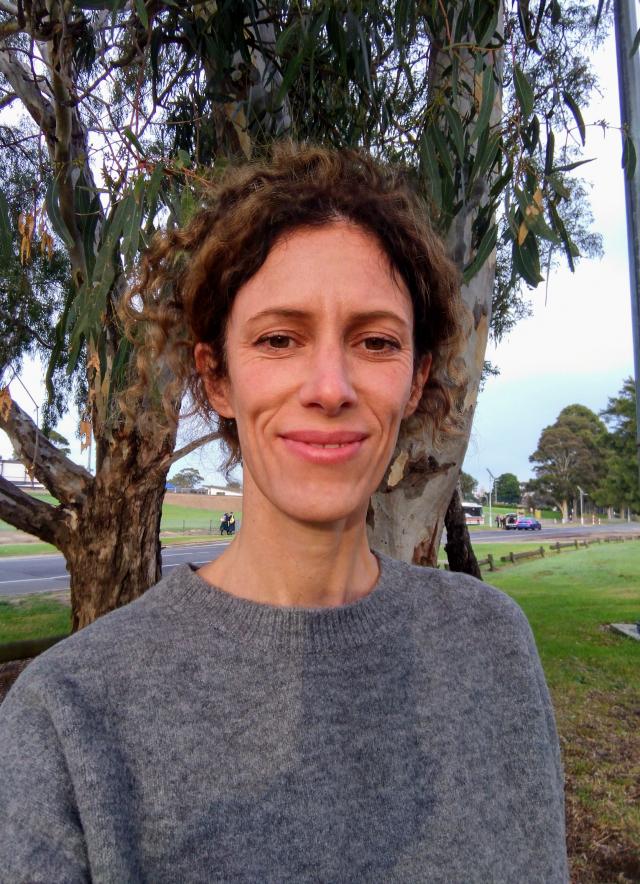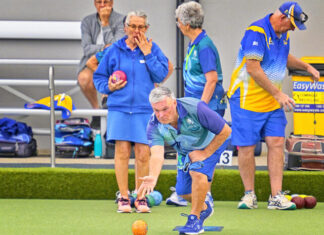Geelong One Fire Reconciliation Group member Matthia Dempsey chats with Elsie Lange ahead of National Reconciliation Week, which runs from May 27-June 3.
Tell us a bit about you and what you do.
I’m a writer and editor and moved here to Geelong/Djillong on Wadawurrung Country six years ago with my husband, two kids and our dog. At present I work on a trade publication about the book industry. I also volunteer as a member of Geelong One Fire Reconciliation Group – a group I joined in 2018 after being part of an incredible workshop at my then workplace, facilitated by Paola Balla, a Wemba-Wemba and Gunditjmara artist, curator and speaker. To my eternal shame, it took her generous and patient facilitation – and recommendation of Clare Land’s book Decolonising Solidarity – to make me realise that my fear of doing more harm than good as a non-First Nations person taking action for change shouldn’t stop me doing anything at all. Rather, I needed to read more, listen more and be prepared to be uncomfortable a lot of the time.
Tell us about Geelong One Fire.
Geelong One Fire was established in the nineties by members that included First Nations and non-Aboriginal people who were involved in the Native Title movement at that time. Now, as a diverse membership of non-First Nations people, our focus is on backing the self-determination of Aboriginal peoples, and taking responsibility for our own learning in order to do that respectfully and usefully. We believe that recognition for First Nations sovereignty, acknowledgement of the true history of this continent and addressing the inequality that stems from that past, are key dimensions of what we continue to call reconciliation, but which I think of as reckoning or makarrata – that is, a process that recognises past conflict and the need for justice, rather than implying equal responsibility on the part of colonisers and colonised.
What’s your connection to Geelong?
When my husband’s grandmother was still alive, we used to come here to visit her and also his brother and sister-in-law who still live here with their kids. We loved the bay, walking by the river and the feeling of space and quiet. Recently my mother-in-law, who was born here but moved away as a kid, and my father-in-law, returned to live here too. And living here we are also a bit closer than we were to my dad who lives in the Otways on Gadubanud Country.
What do you like about where you live?
Where do I start?! In the wider region I love the beaches, visiting Wurdi Youang/You Yangs or seeing the mountains rising up from across the bay when I drive into town, the beautiful trees that still line the creek at Dooliebeal – recognised now with the Wadawurrung name that references these red gums. I like knowing the neighbours up and down our street and even the challenge of learning about a place that is all new to me but has its own long history. It’s such beautiful country here.
What, if anything, would you change about where you live?
I think the things I would like to see change about where we live are similar wherever you go across this continent. For a start, greater recognition of First Nations people, culture and history. Geelong One Fire members learn and take guidance for our activities from Wadawurrung traditional owners and members of the broader Aboriginal and Torres Strait Islander communities here. We partner with these communities on the annual Reconciliation in the Park event, and – working with Koori Engagement Support Officers – a schools cultural education one-day event. As individuals, we bring others into conversations (and hopefully action) to support the strong work that is always, and has always, been undertaken by First Nations people, for change and justice.
Where is your favourite local place to spend time?
The street that runs parallel to ours used to be a creek before that waterway was sent underground. In the mornings I love seeing the early sun hit the eucalypts that line that road, smelling the scent that comes off the leaves as the sun begins to heat them, and hearing all the birdsong. It feels like the birds still know it’s a river there. It’s not a flashy part of the world, you might not notice it driving through, but it’s somewhere I can visit every day and feel connected to this place.
Tell us something people would be surprised to know about you.
That I really don’t like being in the public eye at all! But here I am telling strangers about myself. I’m doing this because Nikki McKenzie, who programmed Reconciliation in the Park this year, asked me to and I thought of the National Reconciliation Week theme to ‘be brave, make change’. So here I am being brave. There are many ways to respond to that imperative, I hope readers find their own ways too.







